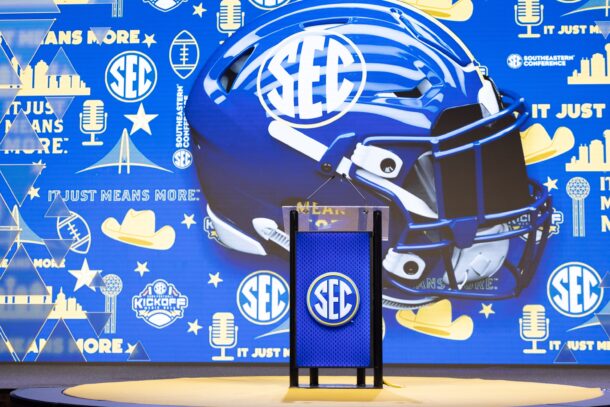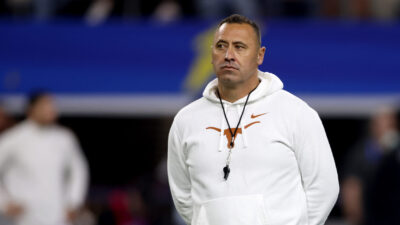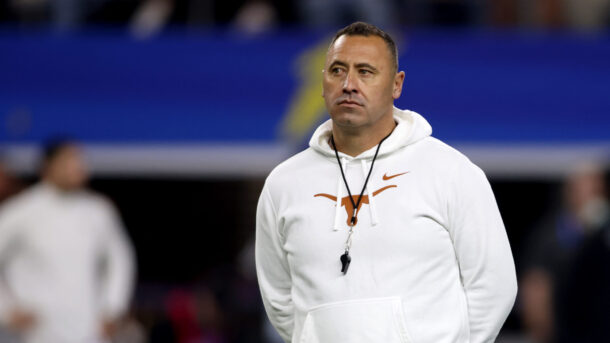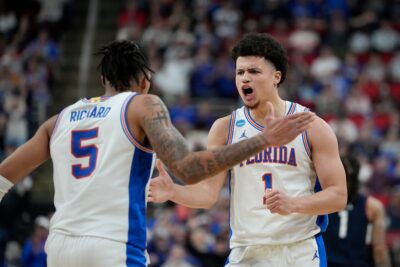Ad Disclosure
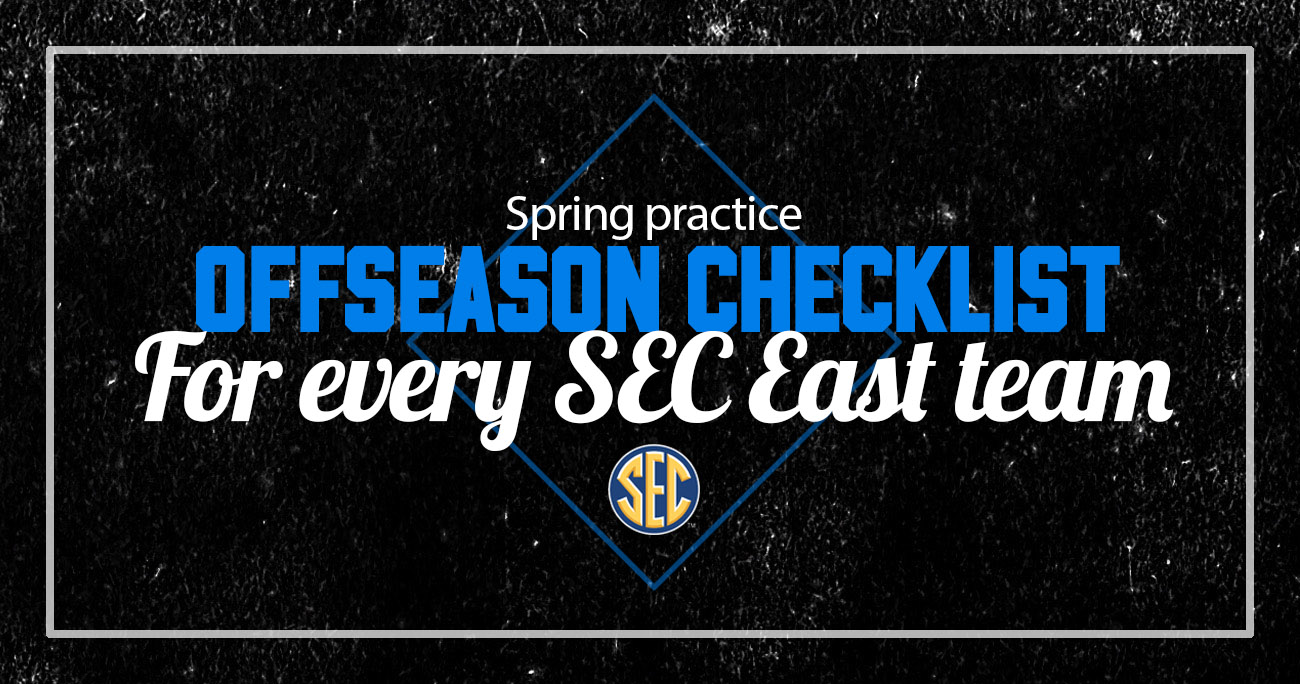
It’s not December 25, but we’re making a list and checking it twice as spring practice opens up full force next week.
Here’s a checklist of needs for every SEC East team in 2016. Has your program completed its list, or is there more work to be done?
FLORIDA GATORS
Checked off
- Find a viable QB option other than Treon Harris. The Gators had stashed Luke Del Rio, who sat out 2015 as mandated by the NCAA after transferring from Oregon State. But Florida also added grad transfer Austin Appleby and signed two true freshmen in Feleipe Franks and Kyle Trask.
- Install a new defensive backs coach. Florida lifted Torrian Gray from Virginia Tech. Born and raised in Lakeland, Gray not only is a good developmental coach but he’ll be an important recruiter as well.
Uncertain
- Solidify the offensive line. The team did a fairly brilliant job of hiding this as a deficiency before Will Grier’s suspension last year. But as quarterback play waned, so did the blocking. As this group gets more experienced and adds depth, it’s important that it also makes tangible progress.
Still need
- Develop another primary receiver. Demarcus Robinson left for the NFL draft, making it necessary for the team to find a second receiver to compliment Antonio Callaway. And then Callaway made a mysterious disappearance. He hasn’t been with the team since January, coach Jim McElwain tells us, but the won’t say why. In any case, the team will need the tight ends and players like C.J. Worton and Ahmad Fulwood.
GEORGIA BULLDOGS
Checked off
- Address the coaching situation. Athletic director Greg McGarity faced some difficult options. Get rid of Mark Richt and you’re firing a beloved 15-year coach with a good track record with no guarantee you’ll get better. Keep him and a big segment of the fan base is increasingly agitated. McGarity made a big move despite UGA finishing the season on a winning streak and UGA has done a nice job of selling the Kirby Smart hire.
- Secure Jacob Eason. A UGA commitment all the way, it still was important that the new coaching staff ensured Eason signed and enrolled in Athens. Not all positions are created equal, and the nation’s No. 2 pro-style quarterback could be special as well as impactful.
Uncertain
- Get Nick Chubb healthy. For a program in transition, a Heisman-worthy talent at running back would smooth over a lot of potential rough edges. News on Chubb’s rehab is positive thus far, but it’s important that the team’s medical staff provides adequate support to get Chubb back to his explosive self.
Still need
- Make a decision at quarterback. Is Eason ready to take over as a true freshman? Or should the team try to squeeze the most out of a game-managing Greyson Lambert for one more year? It’s a decision that could determine the fate of this ’16 team.
- Rework the front seven on defense. Gone are Leonard Floyd, Jordan Jenkins, Chris Mayes, Sterling Bailey, James DeLoach and Jake Ganus, among others. Mel Tucker should have an excellent secondary, but it’s important that he evaluates and develops the young players up front. Trent Thompson is a nice young piece around which to build the defensive line, which is a start.
KENTUTCKY WILDCATS
Checked off
- Upgrade personnel along the offensive line. Kentucky has added some nice talent in the last several recruiting classes. But as long as UK is getting beat at the line of scrimmage, it won’t be able to maximize its other pieces. The offensive line in particular has languished. Drake Jackson, Landon Young and JUCO transfer Tate Leavitt is as good as it’s going to get for an offensive line class at Kentucky and should provide a big upgrade.
Uncertain
- Make better use of the skill players. Boom Williams has the potential to be a relative star in the SEC at running back, and the team’s receivers — especially the class of 2014 — are more talented than they showed last season. Shannon Dawson did not work out as the team’s offensive coordinator. We’ll see if Eddie Gran is able to develop the talent and it in better positions to succeed.
- Find a way to avoid a second-half collapse. Expectations are relative at Kentucky. But getting to a bowl game in most years, even a lower-tier game, is important at this stage of the Mark Stoops tenure. The team got off to a surprising start in ’14 and couldn’t close, then looked to be in excellent position early in ’15 before a similar fall-off. Now’s the time to figure out why — conditioning? confidence? — and do something about it.
Still need
- Find a pass rush. Between the NFL draft (Bud Dupree, Za’Darius Smith), graduation (Josh Forrest, Cory Johnson) and team dismissal (Jason Hatcher), Kentucky lost a lot of personnel in this area in the last two years. Denzil Ware may be a start, but UK needs contributions from others as well.
- Develop Drew Barker. Adding JUCO transfer Stephen Johnson was necessary. But when Patrick Towles and Reese Phillips decided to transfer, the 2016 passing game always was going to rest on Barker’s shoulders. UK can’t afford for Barker’s development to stall like that of Towles in ’15.
MISSOURI TIGERS
Checked off
- Replace a school legend. One assumes Gary Pinkel would’ve liked a more digestible and peaceful final year. He still retires as the school’s all-time wins leader. Continuity was a staple of his tenure, and so it’s fitting that the team hired Barry Odom, a former Mizzou player and two-time assistant coach, as his replacement.
- Identify someone to develop the quarterbacks. Mizzou has been very good at the position in recent history: Brad Smith, Chase Daniel, Blaine Gabbert, James Franklin. But Maty Mauk never shed his bad habits (on the field) and Drew Lock looked unprepared as a true freshman. Odom has selected former Oklahoma quarterback and offensive coordinator Josh Heupel to be the program’s new quarterback whisperer.
Uncertain
- Convince potential recruits that Mizzou is a stable environment. Whatever your opinion on the social unrest that took place on campus last year, it’s had a real fiscal impact on the university, which expects enrollment to decline by 1,500 students. Always near the bottom of the SEC recruiting rankings, Mizzou faces further challenges with a coaching change. Now Odom must convince potential recruits that the team and the campus are enjoyable environments.
Still need
- Figure out the offensive line. Even with four seniors — including two NFL prospects — the unit languished in 2015. I thought Mizzou played Connor McGovern out of position and didn’t do the group any favors by rotating personnel constantly in spring and fall practice. Two JUCO transfer tackles in Tyler Howell and Malik Cuellar also made almost zero impact. This year’s unit will be very green, but establishing some continuity and trying to make use of Howell and Cuellar would be a good start.
- Develop some skill players — fast. See a theme here? Most all of the issues with this program right now are on offense. J’Mon Moore, Nate Brown, Ish Witter and transfer receiver Chris Black appear to be the nucleus entering spring ball. But the team is going to need to help all four players improve and also find some other contributors, perhaps among JUCO transfer running backs Natereace Strong and Chase Abbington (with the team in 2015) or some of the raw young skill players.
SOUTH CAROLINA
Checked off
- Figure out the move post-Steve Spurrier. It wasn’t clean. The team supposedly thought it had convinced Tom Herman to come to Columbia and then flirted with a few other coaches before ultimately settling on Will Muschamp, at least the third option. But the team is well-positioned for what is another cyclical uptick in South Carolina prep talent, as Muschamp’s staff is excellent from a recruiting standpoint. And perhaps his Florida experience taught him the importance of a potent offense.
- Keep Brandon McIlwain in the fold. One of the initial benefits of that recruiting upgrade within the coaching staff was retaining the touted dual-threat quarterback as part of the 2016 class. He’ll compete with Lorenzo Nunez to run Roper’s spread offense.
Still need
- Find some sort of playmaker on offense. Pharoh Cooper, Jerell Adams and Brandon Wilds arguably were the three most impactful offensive players last season, and all three are trying to become NFL players. The team’s situation at receiver seems particularly dire from the current vantage point. It didn’t work at Florida, but offensive coordinator Kurt Roper succeeded at doing more with less at Duke for years. Perhaps he can recapture that here.
- Revive the defensive line. It wasn’t long ago that players like Jadeveon Clowney and Kelcy Quarles gave opposing offensive lines nightmares. Darius English (4.5 sacks in ’15) is the only Gamecocks player with more than 3 sacks in either of the last two seasons. That needs to change, but Muschamp has a long history of cultivating good pass rushers.
TENNESSEE
Checked off
- Keep the running game special. Alvin Kamara decided to return to school, so Tennessee’s three-headed rushing attack returns to Knoxville. It could be the best in the SEC this season, and if UT can get early leads this is going to be a powerful element.
Uncertain
- Make the transition to Bob Shoop on defense. Because Tennessee played well on that side of the ball last year, making a change at coordinator seems somewhat risky. Will it lead to marginal improvement, or will the transition backfire? Shoop is a well-respected coach and he’s got some talented players, so we’re betting it works out.
- Find a way to win big games. Coach Butch Jones is 3-18 against top 25 teams in his college football career. He caught criticism for getting conservative in the second half of several losses last season and gave away four close games. For Tennessee to have a truly special season, the team needs to figure out a formula to beat the Alabamas and Floridas of the conference.
Still need
- Improve the downfield passing game. It’s the one missing element that could be the difference between 9 wins and playing in Atlanta. This is a two-pronged challenge. Joshua Dobbs to this point hasn’t been good at going to his second and third reads as a passer and being accurate downfield. And Tennessee’s receivers did not present many attractive downfield options in ’15.
- Find a left tackle. Kyler Kerbyson’s graduation and Chance Hall’s injury mean that Drew Richmond and Dontavius Blair are getting the first opportunity to impress coordinator Mike DeBord. Kerbyson played well at the position last year, and the Vols need at least a similar level of play from left tackle in 2016.
VANDERBILT
Checked off
- Create a sense of momentum. Last offseason, the first for head coach Derek Mason, the team replaced a load of assistant coaches, including both coordinators. There already was talk of Mason’s job being in jeopardy, and the non-conference schedule looked daunting. Then the team won a pair of SEC games and played respectable ball against good teams like Ole Miss and Florida. Mason needs to leverage that to try to create a sense of progress and excitement within the program.
Uncertain
- Revamp the offensive line. The unit was brutal last season and lost two long-time starters (Spencer Pulley, Jake Bernstein). Vandy made a coaching change (hired Cameron Norcross) and gets perhaps its best offensive player back from injury (Andrew Jelks). Will all of that equate to better play?
Still need
- Generate a downfield passing game. Vanderbilt finally seems to know who will start at quarterback (Kyle Shurmur). But can the Commodores get anything going downfield to keep the offense from being so predictable? That would be a huge help to running back Ralph Webb, who gets punished every week by opposing SEC defenses.
An itinerant journalist, Christopher has moved between states 11 times in seven years. Formally an injury-prone Division I 800-meter specialist, he now wanders the Rockies in search of high peaks.
